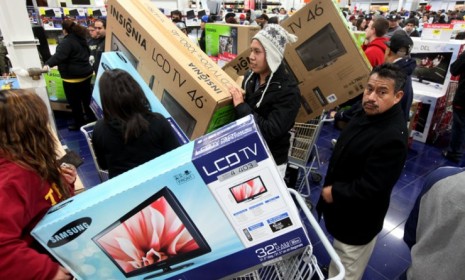How Black Friday ate Thanksgiving: A brief history
As retailers battle for holiday shoppers, they're pushing up what were once post-Thanksgiving sales into the holiday itself

A free daily email with the biggest news stories of the day – and the best features from TheWeek.com
You are now subscribed
Your newsletter sign-up was successful
Retailers have long embraced the Friday after Thanksgiving as a day of discounts, bringing in the crowds and kicking off the holiday shopping season. But this year, a number of major stores will be launching their Black Friday sales one to four hours earlier, taking the biggest bite ever out of Thanksgiving by opening as early as 8 p.m. on Thursday night. The stakes are high — American retailers typically count on the holiday season for a third of their annual sales. Still, are big-box giants such as Walmart, Target, and Toys R Us going too far by letting the sales event eat into one of the most family-focused holidays of the year? Here, a brief guide to Black Friday and its creep into Thanksgiving:
What are the origins of Black Friday?
The weekend following Thanksgiving has marked the start of the holiday shopping rush for Americans since the 19th century. New York City's big department stores really embraced the idea as a marketing gimmick in the early 20th century, staging events, releasing their first Christmas ads, and hosting parades, most notably Macy's annual extravaganza, which debuted in 1924. The post-feast shopping frenzy quickly became so important to merchants that, during the Great Depression year of 1939, they appealed to then-President Franklin D. Roosevelt to extend the buying period by moving up Thanksgiving. Roosevelt obligingly declared that Thanksgiving would be held a week earlier, but he did so too late to have much effect. Most people ignored "Franksgiving" and celebrated on the regular date.
The Week
Escape your echo chamber. Get the facts behind the news, plus analysis from multiple perspectives.

Sign up for The Week's Free Newsletters
From our morning news briefing to a weekly Good News Newsletter, get the best of The Week delivered directly to your inbox.
From our morning news briefing to a weekly Good News Newsletter, get the best of The Week delivered directly to your inbox.
How did Black Friday get its name?
In the '50s, people running factories started referring to the day after Thanksgiving as "Black Friday" because so many employees failed to show up for work. In the early '60s, Philadelphia police started using the term to refer to the onslaught of jaywalking shoppers that converged on the downtown. By the '70s, the name was more widely used to connote the kick-off of holiday shopping, but still bore negative connotations. It only took on a positive ring in the '80s, when some shop owners pointed out that the profitable, big, post-Thanksgiving rush put "black ink" on their balance sheets for the first time of the year.
Why is it moving earlier?
Competition — for sales, and for deals — has spiked in the last several years. Even after the great recession, Target was reluctant to push its Black Friday sale into Thanksgiving proper, waiting until Thursday at midnight to make its "door buster" bargains available. But as competitors moved up the sale, pressure built to get started before the holiday was over. "Customers repeatedly told us that they liked being able to do their Black Friday shopping after they had finished their turkey dinners," says Troy Rice, executive vice president of stores and services at Toys R Us, "so they didn't have to spend all night outside in line and could sleep in on Friday."
A free daily email with the biggest news stories of the day – and the best features from TheWeek.com
So this is all about making customers happy?
Not entirely. There is also a safety element — in 2008, an employee at a Long Island, N.Y., Walmart was trampled to death by a stampede of Black Friday shoppers. Stores claim that this year's changes are designed to spread out the wave of 134 million people the National Retail Federation expects to charge into stores on Thanksgiving weekend this year. Walmart, which kicked off the creep into Thanksgiving by opening at 10 p.m. last year while competitors waited until midnight, is offering one round of bargains at 8 p.m. on Thanksgiving, and another at 5 a.m. on Black Friday. Not everyone is happy about the idea, though. A petition circulated by a Target employee who wants the store to stay closed to avoid "Thanksgiving creep" had more than 148,000 supporters as of early Monday. "At this rate," Nancy Koehn, a historian at the Harvard Business School, tells Marketplace, "Thanksgiving might disappear altogether, or the month of November will be called 'Black November.'"
Sources: CNN, Marketplace, Reuters, TIME
-
 How the FCC’s ‘equal time’ rule works
How the FCC’s ‘equal time’ rule worksIn the Spotlight The law is at the heart of the Colbert-CBS conflict
-
 What is the endgame in the DHS shutdown?
What is the endgame in the DHS shutdown?Today’s Big Question Democrats want to rein in ICE’s immigration crackdown
-
 ‘Poor time management isn’t just an inconvenience’
‘Poor time management isn’t just an inconvenience’Instant Opinion Opinion, comment and editorials of the day